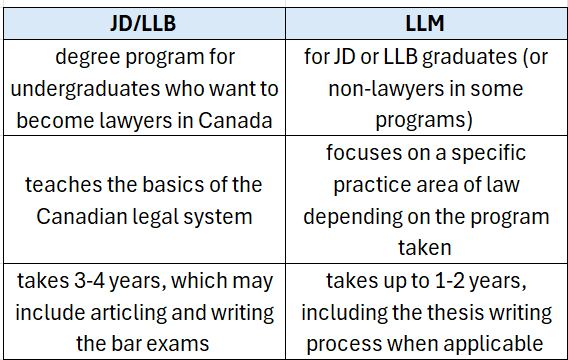Interested in enrolling in an LLM degree in Canada? This guide will help you learn more about this program as offered by different Canadian law schools

Updated 27 Mar 2024
Whether you’re a Canadian lawyer who wants to expand your career horizons or a foreign lawyer who wants to practice law in Canada, pursuing an LLM degree may be one of your best options.
This article will help you know more about the LLM programs of the different Canadian law schools, including its admission requirements, and its benefits for you in the long run.
What is an LLM degree?
LLM programs, also called Master of Laws, are graduate programs offered to lawyers or those who have completed their Juris Doctor (JD) degree or Bachelor of Laws (LLB).
For practicing lawyers, it is a further graduate study for advanced legal education, career advancement, or as a pre-requisite to take up a doctorate program (PhD) in law. This post-graduate degree can also help lawyers specialize in an area of law in which they are currently practicing.
Graduates of LLM degrees have many opportunities afterwards. It can open doors to teaching, professional research, and policy work.
Curriculum and coursework
To understand the LLM degrees in Canada, it can be viewed through the following perspectives:
- according to specific practice area
- according to curriculum or program delivery
- whether full-time or part-time
An interested applicant may consider these factors when applying for an LLM degree. This is because each faculty of law has its own specialized practice areas they offer, and the mode that these programs are implemented.
Practice areas of LLM degrees
An applicant can choose the specific practice area that they want to pursue in their LLM, in relation to choosing the program delivery of LLM degrees (thesis-based or coursework).
This is the main advantage of LLM degrees. It focuses on a legal practice area, which can greatly help in the applicant’s professional work after graduating.
To give an example, the LLM of the University of Calgary Faculty of Law offers a specialization in Natural Resources, Energy and Environmental Law. This is aside from its general LLM track.
Program delivery for LLM degrees
LLM degrees in Canada can either be:
- research-intensive: research-intensive, or thesis-based studies, will be geared more toward advancing research in a specialized area of the law
- coursework-oriented: coursework-oriented students want to specialize in specific areas of the law and expand their understanding of legal processes
Most Canadian universities and faculties of law offer both options for its LLM applicants. For example, the Osgoode Hall Law School of York University offers two options for its LLM students, following a similar program delivery:
LLM (Research)
- thesis-based program for those who want to study a specific area of legal study
- the curriculum needed for those who want to enroll in Osgoode’s PhD in Law program
- composed of a graduate seminar, a study group, elective courses, and submission of either a thesis or a major research paper under the supervision of a faculty member
LLM (Professional)
- course-based program offered to Canadian and international lawyers (and non-lawyers for the International Business Law)
- can be taken either full-time or part-time
Some specific areas of law include:
- Administrative Law
- Canadian Common Law
- General Law
- International Business Law
- Labour and Employment Law
- Taxation Law
Full-time vs. part-time
A faculty of law’s LLM degree may also be taken on a full-time or part-time basis. This will affect the amount of coursework required over a specific period, and even the tuition fees.
For instance, the Peter A. Allard School of Law of the University of British Columbia (UBC) offers registration options of full-time or part-time for its LLM program.
Full-time students need to pay full-time tuition fees, with an alternative tuition schedule in some cases. LLM program enrollees of UBC are automatically assessed as full-time students.
Students may also be assessed part-time tuition fees only when formally approved by their Graduate Program Advisor and the Faculty of Graduate and Postdoctoral Studies.
While a part-time master's program is allowed by the UBC, it’s also subject to the five-year maximum time to complete the program.
Watch this video to learn more about the graduate programs offered by the Peter A. Allard School of Law:
The Peter A. Allard School of Law is among the most affordable law schools in Canada. Read our article on the 10 cheapest Canadian law schools to find out which other institutions made the list.
NCA requirements for foreign lawyers
Lawyers from foreign countries can also apply for an LLM degree in Canada, since it can be a mode to complete their National Committee on Accreditation (NCA) requirements. Foreign applicants must ensure that the LLM degree they’re applying for is compatible with the NCA requirements.
What are the admission requirements for an LLM degree?
Practicing lawyers and even new lawyers can apply for an LLM degree at any Canadian law school. The only things that may matter are its location, areas of law it offers, and the tuition costs.
Admission requirements
Although the admission requirements of LLM degree programs in different schools might vary, there are some general requirements that applicants must meet.
All applicants must have a JD or LLB degree. Next, some schools may require a certain level of academic achievement based on the applicant’s JD or LLB studies.
By way of example, here’s the admission standards for the LLM program of the Faculty of Law of the University of Toronto (UofT):
- must have a JD or LLB from a recognized university
- must achieve the equivalent of UofT’s B+ standing in the final year of their JD or LLB (applicants who are still completing their JD or LLB may use their second-last year’s grades)
- must demonstrate an adequate level of proficiency in English (international applicants must attach the results of their English language proficiency exam)
Here are some tips from the UofT on how to write your LLM application:
Looking for the best lawyers in the country and where they studied for their LLM degrees? Check out this list of the best lawyers in Canada.
Application process
Applicants must be aware of each law school’s application process along with its own deadlines and admission requirements.
For an idea how an application process of an LLM degree in Canada, here’s the process of McGill University – Faculty of Law’s graduate programs, which includes its LLM programs:
- Create an account in McGill’s admissions portal
- Start an application, complete all forms, and pay the admission fees
- Upload the supporting documents (e.g. transcripts, recommendation letters, etc.)
- Submit English test scores, if applicable
The deadline for admission to McGill’s graduate programs is on 1 December, since it doesn’t have winter and summer admissions (which other law schools may have for its other degree programs).
This process of McGill is also somewhat similar with the other faculties of law offering graduate programs. It would only be the specific deadlines which may vary per law school.
What are the benefits of pursuing an LLM degree in Canada?
There are many benefits when a recent law graduate – or a senior lawyer – pursues an LLM degree in Canada.
It can help them land a job in academia, or a career with a firm practicing in their chosen legal practice area. They can also do both. Either way, having an LLM will never disadvantage one's legal career.
Read more about these benefits straight from the lawyers who have finished their own LLM degrees:
Career advancement
An LLM degree in Canada can open new career possibilities within the legal profession. One of these is for career development for both new and senior lawyers.
Ari Kaplan, who holds an LLM from Osgoode Hall Law School, emphasizes that students who choose to do their LLM can truly benefit from the collection of experiences within the classroom. He chose to do his master’s at once after being called to the bar in 2000 but went part time and completed his studies in two years.
For the most part, career advancement is one of the strongest benefits one can get after graduating from an LLM program.
Path towards the academe
Aside from helping lawyers in their practice of litigation, an LLM is also a step in a new direction towards the academic world.
Doug Harris, a current UBC professor who also received his LLM from UBC, provides an example of how an LLM degree can lead students to where they can prosper. “I practiced private law for a while, but decided it wasn’t a path I wanted to take. Doing my LLM pushed me in the direction of teaching, which is something that fits me a lot better,” Harris says.
Advanced legal education
Harris believes that LLM programs are the first step to teaching law, the next being a PhD. He says that a master’s program can open new opportunities for students to do something else with their legal training.
Also, many of Harris’ students are lawyers who practiced law for years before returning to the classroom. “Some of my students have already practiced for a lifetime,” he says. “I had a few students last year who could have retired had they chosen to but jumped to an LLM for several reasons.”
Harris added that “these kinds of students really add to the classroom environment because of their number of experiences in the legal world.”
Legal practice specialization
Eric Adams says his LLM degree is especially helpful in his work. Adams is a 2009 UBC LLM graduate practicing insurance law with Dutton Brock LLP in Toronto.
Adams’ thesis covered the theories of causation law, which describes how insurance policies define accidents, and the causes in between.
He thinks his master’s has helped him develop his specialization because his area of the law is situated around policy arguments. This was developed in his theoretical LLM courses, Adams says.
“I think the value of an LLM is completely dependent on the area of law you choose to pursue. Those streams that require more understanding of how to analyze policies, like insurance and coverage law, fall into that category because they are fact-driven, and very theoretical.”
Opportunity for senior lawyers
In addition to serving as an advanced legal education for lawyers, LLM degrees also provide other opportunities for seasoned lawyers.
Kevin Rowe, an Osgoode LLM graduate who practices trust law with CIBC Mellon Trust Co. in Toronto, agrees that mature students add to the classroom environment through their sharing of experiences.
“I waited quite some time before going back to do my LLM where I focused on trust law, and I found that a lot of my classmates were in the same boat,” Rowe says. “There was a significant number of students who had jumped right into their LLM, but a lot like me who had practiced for a number of years before going back to specialize in my area of law.”
Rowe admits that mature students like him are a significant resource to students who have not had any professional experience.
Beneficial for law firms
Linda C. Reif thinks that LLM graduates are beneficial in practice, especially those who go on to work for boutiques and larger firms. Reif is currently a professor at the University of Alberta Faculty of Law.
She believes that focusing on an area of the law can benefit a larger firm because there is more room for specialization. There is also the financial backing to support a lawyer with expertise in a particular field.
“I think graduate students represent people with superior academic initiative, which in turn, relates to the way they research and solve problems,” she says. “If you want to teach, [an LLM] is a good place to start, but in practice, there are definitely benefits too, especially in larger firms.”
FAQs about the LLM degree in Canada
Below are some of the questions and answers on LLM programs in Canada:
What is the difference between JD/LLB vs. LLM?
Here are some of the differences between the JD/LLB and the LLM degree:
How long is LLM in Canada?
Depending on the faculty of law that you’re applying for, an LLM degree in Canada may take up about 1 to 2 years. This will also depend on whether you’re studying full-time or part-time.
Where can I study LLM in Canada?
Most law schools in Canada that offer the JD program also offer graduate studies, such as LLM and PhD studies.
Explore our list of Canadian Law Schools if you’re looking for the best universities to earn your LLM degree in Canada.
How can I survive studying for an LLM?
Rowe emphasizes the importance of committing yourself to the program, echoing Kaplan’s sentiment about the theoretical focus of the program. “You have to really make space in your life to do the program, especially if you are already working,” Rowe says. “There is a lot of reading, and you need to learn how to make time for that — you really have to like school to do well in an LLM program.”
Take that step towards an LLM degree
An LLM degree in Canada offers a blend of academics and real-life experience, tailored for lawyers ready to deepen their expertise and elevate their career.
Whether you're looking to dive deeper into a specific area of law, aim for career advancement, or shift towards academia, an LLM degree can provide the tools and knowledge to achieve those goals. Let this guide serve as your starting point in pursuing an LLM degree in Canada, setting the stage for the next exciting chapter in your legal journey.
Bookmark our Legal Education page to find more resources and guides on Canada’s law schools and LLM degrees in Canada.











